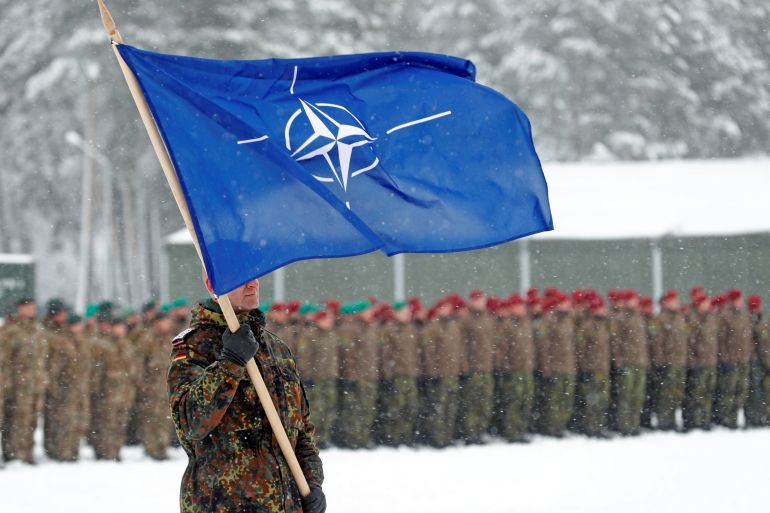NATO sends reinforcements to Eastern Europe amid Russia tensions
NATO said it was sending more ships and fighter jets, in what Russia denounced as an escalation of tensions over Ukraine.

NATO said it was putting forces on standby and reinforcing Eastern Europe with more ships and fighter jets, and could also send additional troops to its southeast flank, in what Russia denounced as an escalation of tensions over Ukraine.
Welcoming a series of deployments announced by alliance members in recent days, Secretary General Jens Stoltenberg said on Monday NATO would take “all necessary measures”.
Keep reading
list of 3 itemsCan tensions about Ukraine be defused?
US military aid arrives in Ukraine amid Russia border tensions
The move was a further sign that the West is bracing for Russia to attack its neighbour after massing an estimated 100,000 troops in reach of the Ukrainian border.
“We will always respond to any deterioration of our security environment, including through strengthening our collective defence,” Stoltenberg said in a statement.
He later told a news conference that the enhanced presence on NATO’s eastern flank could include the deployment of additional NATO battlegroups.
“We are considering also to have battlegroups … in the southeast of the alliance,” Stoltenberg said.
So far, NATO has about 4,000 troops in multinational battalions in Estonia, Lithuania, Latvia and Poland, backed by tanks, air defences and intelligence and surveillance units.
Russia has denied planning an invasion. But, having engineered the crisis by surrounding Ukraine with forces from the north, east and south, Moscow is now citing the Western response as evidence to support its narrative that Russia is the target, not the instigator, of aggression.
The US military said on Monday it has put up to 8,500 troops on alert to be ready to deploy to Europe, potentially at very short notice, should the NATO alliance activate a rapid response force.
Pentagon spokesman John Kirby stressed that no decision had yet been made on whether to deploy the troops, and that any such deployment would separate from intra-European movements of US troops to NATO’s eastern flank, to reassure nervous allies
US President Joe Biden will hold a video call with European leaders later on Monday as part of the coordination with allies to respond to Russia’s build-up on Ukraine’s borders, the White House said.
Growing tensions
Denmark, Spain, France and the Netherlands were all planning or considering sending troops, planes or ships to Eastern Europe, NATO said. Ukraine shares borders with four NATO countries: Poland, Slovakia, Hungary and Romania.
A Polish official said Warsaw would draw the line at sending troops to Ukraine.
In a sign of concern about the situation, The United Kingdom said it was withdrawing some staff and dependants from its embassy in Ukraine, a day after the United States said it was ordering diplomats’ family members to leave. US diplomats are being allowed to leave voluntarily.
Kremlin spokesman Dmitry Peskov accused the West of “hysteria” and putting out information “laced with lies”.
“As for specific actions, we see statements by the North Atlantic Alliance about reinforcement, pulling forces and resources to the eastern flank. All this leads to the fact that tensions are growing,” he said.
“This is not happening because of what we, Russia, are doing. This is all happening because of what NATO and the US are doing and due to the information they are spreading.”
Al Jazeera’s Dorsa Jabbari, reporting from Moscow, has said there is a “lot of concern” in Russia about NATO’s moves to bolster the alliance’s eastern flanks.
“But the Russians … are not standing by watching events unfold … they have said they will continue to move their military hardware and troops to their borders, wherever they see fit,” she said.
‘Painful, violent and bloody’
Asked whether he thought an invasion was imminent, British Prime Minister Boris Johnson told broadcasters that intelligence was “pretty gloomy on this point” but that “sense can still prevail”.
He repeated Western warnings that invading Ukraine would be “a painful, violent and bloody business” for Russia.
The United States and the European Union, wary of Russia’s intentions since it seized Crimea and backed separatists fighting government forces in eastern Ukraine in 2014, have told Russia it will face crippling penalties if it attacks again.
EU foreign ministers meeting in Brussels warned Russia it would face “massive” consequences, but are divided about how tough to be on Moscow and did not say what the consequences might be.
Ukrainian President Volodymyr Zelenskyy told EU President Charles Michel by phone that it was important for Kyiv that the EU showed unity.
“Ukraine will not fall for provocations, and together with its partners, will remain calm and restrained,” his office said.
The European Commission, the EU executive body, proposed a 1.2-billion-euro ($1.36bn) financial aid package to help Ukraine mitigate the effects of the conflict with Russia.
A Russian delegation source said political advisers from Russia, Ukraine, France and Germany would meet in Paris on Wednesday for talks on resolving the conflict in eastern Ukraine, in which some 15,000 people have been killed since 2014. Previous efforts have failed to yield any breakthrough.
Several countries, including France, Norway and Latvia, have advised against non-essential travel to Ukraine.